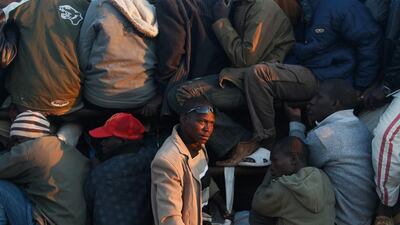Hassan – not his real name – is a Ugandan Muslim. He arrived in Tripoli, Libya nearly 25 years ago to work and improve his family’s life back home, where he supports his wife, son, father and mother.
Every year he would save about $6,000 (Dh22,000) and send this money home either with friends or through money-transfer companies. He used to go back to Uganda every two years, but he has not been home since the Libyan uprisings erupted in 2011.
He is worried that if he leaves, he might not be able to go back to Libya. He does not have the right papers and getting a re-entry visa is almost impossible.
Since I employed Hassan two years ago I have tried to have him registered and have sought a residence permit for him.
Every time I check with the relevant authorities, the answer is the same: not yet. Hassan’s status is just another example of the collapse of Libya into total chaos.
During all these years in Libya Hassan has never considered leaving the country to travel to Europe like the thousands of other migrants who undertake the treacherous journey in search of a better life across the Meditteranean.
“Before 2011, we used to be safe in Libya,” he says. “Since the revolution it has become dangerous and difficult.”
During the 2011 revolution and ensuing conflict many Africans were jailed, tortured and even killed. Ever since, many people from the African nations south of Libya have been trying to keep a low profile.
Hassan does not go anywhere after dark. When he is out, he rushes home before sunset.
He has a few friends he visits once a month and goes shopping around the village in southern Tripoli where he lives in my house as a guard.
Hassan says: “It is not easy any more for me as a black African. Many gangs of young boys and sometimes adults could stop me anywhere and take whatever I have. I cannot even report it to the police since I have no papers.”
Hassan speaks with apparent pain about the time when he could go anywhere in Libya and not fear that he would land himself in trouble.
He is not alone in his fear. Even Libyans in Tripoli – as in many other cities in the country – find it dangerous to go out, particularly at night.
The security situation in the country has been deteriorating since the fall of the regime five years ago.
To many Africans, Muammar Qaddafi, the late Libyan leader, was a hero who protected them and their status. Migrants from other African states have been flocking to Libya in their thousands for years, because work is available and, according to one seasonaed observer, “the money is good”.
These economic migrants point to the less despotic parts of Qaddafi’s complex and brutal legacy. They say that he was a symbol of strength and unity. He founded the African Union, modernising the former Organisation of African Unity. He was working on having a free economic zone across the huge continent complete with an African currency, the gold dinar, to further strengthen economic exchange and free trade.
During his era Qaddafi travelled Arica by road, meeting and talking to poor peasants in Mali, Niger and many other countries.
On his orders mosques, schools and hotels were built and huge investments made in poor countries including Chad, Niger, Uganda and Mali. He argued that Africa should have a permanent representative on the United Nations Security Council.
Qaddafi was a figure head for many Africans, including Hassan, who saw him as a liberator rather than a dictator.
Mustafa Fetouri is a Libyan academic and journalist

